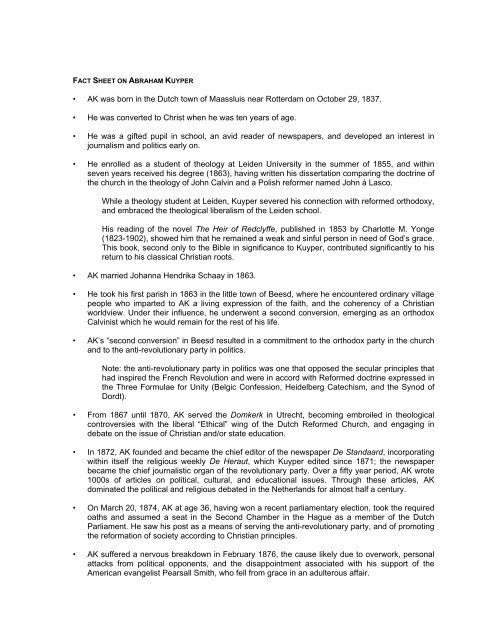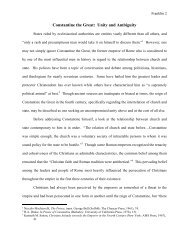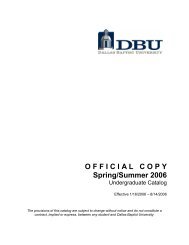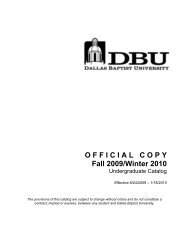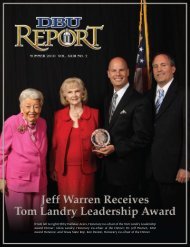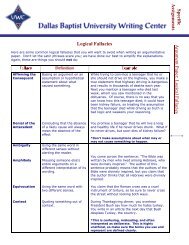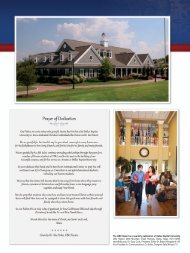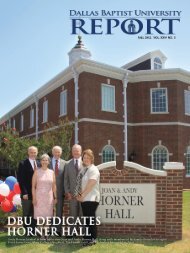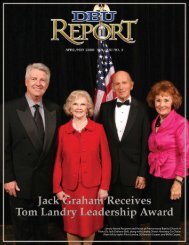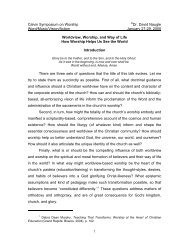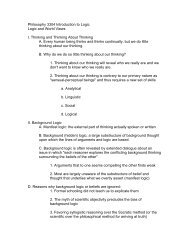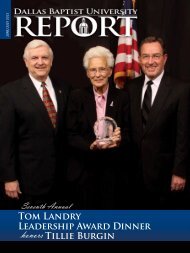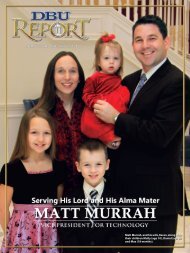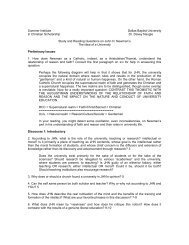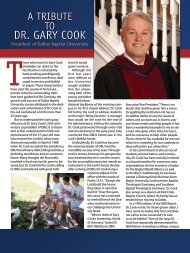FACT SHEET ON ABRAHAM KUYPER
FACT SHEET ON ABRAHAM KUYPER
FACT SHEET ON ABRAHAM KUYPER
You also want an ePaper? Increase the reach of your titles
YUMPU automatically turns print PDFs into web optimized ePapers that Google loves.
<strong>FACT</strong> <strong>SHEET</strong> <strong>ON</strong> <strong>ABRAHAM</strong> <strong>KUYPER</strong>• AK was born in the Dutch town of Maassluis near Rotterdam on October 29, 1837.• He was converted to Christ when he was ten years of age.• He was a gifted pupil in school, an avid reader of newspapers, and developed an interest injournalism and politics early on.• He enrolled as a student of theology at Leiden University in the summer of 1855, and withinseven years received his degree (1863), having written his dissertation comparing the doctrine ofthe church in the theology of John Calvin and a Polish reformer named John á Lasco.While a theology student at Leiden, Kuyper severed his connection with reformed orthodoxy,and embraced the theological liberalism of the Leiden school.His reading of the novel The Heir of Redclyffe, published in 1853 by Charlotte M. Yonge(1823-1902), showed him that he remained a weak and sinful person in need of God’s grace.This book, second only to the Bible in significance to Kuyper, contributed significantly to hisreturn to his classical Christian roots.• AK married Johanna Hendrika Schaay in 1863.• He took his first parish in 1863 in the little town of Beesd, where he encountered ordinary villagepeople who imparted to AK a living expression of the faith, and the coherency of a Christianworldview. Under their influence, he underwent a second conversion, emerging as an orthodoxCalvinist which he would remain for the rest of his life.• AK’s “second conversion” in Beesd resulted in a commitment to the orthodox party in the churchand to the anti-revolutionary party in politics.Note: the anti-revolutionary party in politics was one that opposed the secular principles thathad inspired the French Revolution and were in accord with Reformed doctrine expressed inthe Three Formulae for Unity (Belgic Confession, Heidelberg Catechism, and the Synod ofDordt).• From 1867 until 1870, AK served the Domkerk in Utrecht, becoming embroiled in theologicalcontroversies with the liberal “Ethical” wing of the Dutch Reformed Church, and engaging indebate on the issue of Christian and/or state education.• In 1872, AK founded and became the chief editor of the newspaper De Standaard, incorporatingwithin itself the religious weekly De Heraut, which Kuyper edited since 1871; the newspaperbecame the chief journalistic organ of the revolutionary party. Over a fifty year period, AK wrote1000s of articles on political, cultural, and educational issues. Through these articles, AKdominated the political and religious debated in the Netherlands for almost half a century.• On March 20, 1874, AK at age 36, having won a recent parliamentary election, took the requiredoaths and assumed a seat in the Second Chamber in the Hague as a member of the DutchParliament. He saw his post as a means of serving the anti-revolutionary party, and of promotingthe reformation of society according to Christian principles.• AK suffered a nervous breakdown in February 1876, the cause likely due to overwork, personalattacks from political opponents, and the disappointment associated with his support of theAmerican evangelist Pearsall Smith, who fell from grace in an adulterous affair.
2• The Anti-Revolutionary Party was founded on April 3, 1879, largely due to AK’s efforts; it was thefirst modern, organized popular political party in the Netherlands.• AK was the founder of the Free University of Amsterdam, its first Rector Magnificus, and also aprofessor of theology. The doors opened on October 20, 1880, reshaping higher education in theNetherlands, which came to be organized along religious and ideological lines.• From 1880-1898, AK was characteristically busy, working on a number of projects. He lecturedand wrote extensively on education, produced numerous meditative and devotional works,exerted strenuous efforts toward ecclesiastical reform, began an initiative to work with RomanCatholics in the political and social domains. He also served as the Prime Minister of theNetherlands from 1901-1905. He died on November 8, 1920 at the age of 82.• In 1898, he traveled to the USA to deliver the prestigious Stone Lectures at PrincetonTheological Seminary, beginning on October 10, 1898. He chose as his subject, “Calvinism,”which he believed to be “the only decisive, lawful and consistent defence for Protestant nationsagainst the encroaching, and overwhelming Modernism.” He sought to present Calvinism as anall-embracing “life-system” or worldview (Weltanschauung), stressing the relationship betweenGod, humankind, and the world. He wished to dispel the notion that Calvinism was merely adoctrinal system or ecclesiastical structure. Instead, he sought to show how it was acomprehensive Christian philosophy rooted, as was Calvin’s theology, in the notions of creation,fall, and redemption, comprehensively conceived. Hence, his Stone Lectures covered thefollowing topics:• Calvinism as a Life-System • Calvinism and History • Calvinism and Religion • Calvinismand Politics • Calvinism and Science • Calvinism and Art • Calvinism and the Future• AK has been described in these terms: “A man with a powerful and dominant personality, abroad and encyclopedic knowledge, a lively and engaging style, a pedagogic and polemicaltalent, an inexhaustible reserve of vitality and energy, an aptitude for inspiring, mobilizing, andorganizing large numbers of people with constructive capacity and tactical ingenuity.”• He declared his life’s mission in the following poetic lines:For me, one desire rules my lifeOne urge drives soul and will. . . .It is to re-establish God’s holy ordinancesIn Church and home, in state and school,Regardless of the world’s protestations,For the benefit of the nation.It is to engrave those divine ordinances,To which Word and Creation witnesses,So clearly on the nationThat once again it bows its knee to God.• AK’s comprehensive vision of the Calvinist, Christian faith, engendering what has come knownas “neo-Calvinism” or “Kuyperianism,” has been particularly influential in Reformed theologicalcircles in the United States, and has been promulgated by those associated with Calvin Collegein the USA and the Institute of Christian Studies in Toronto, Ontario, Canada. His thought hasbeen particularly influential among the institutions associated with the Council of ChristianColleges and Universities, contributing significantly to the recent renaissance in evangelicalChristian scholarship. His influence has also reached mainstream Protestant, evangelicalChristianity as the following quotation from Charles Colson indicates:
3Bibliography:“It’s absolutely vital that we look at Christianity as a major life system. Only if we project itthis way into the new millennium can we really impact our culture and the world.”• Abraham Kuyper, Lectures on Calvinism. Grand Rapids: Wm. B. Eerdmans PublishingCompany, 1931. (Six Lectures Delivered at Princeton University Under Auspices of the L. P.Stone Foundation).• Peter S. Heslam, Creating a Christian Worldview: Abraham Kuyper’s Lectures on Calvinism.Grand Rapids: Wm. B. Eerdmans Publishing, Company, 1998.


